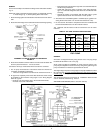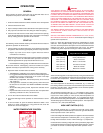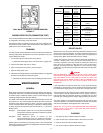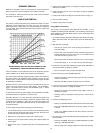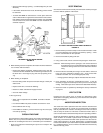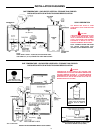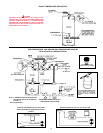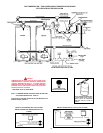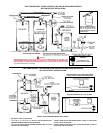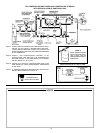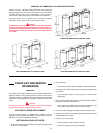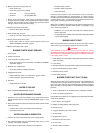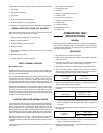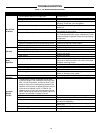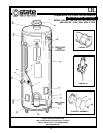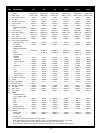
20
8. Burner may not be firing at proper rate.
• Check nozzle size.
• Check fuel pump pressure setting.
• GPO-199 . . . . . . . . . . . 110 psig (758 kPa)
• All others . . . . . . . . . . . 100 psig (689.5 lPa)
9. Burner may be short cycling. Short cycling (too frequent off and on)
of burner will cause sooting. If unit or burner become dirty at frequent
intervals, after correcting the dirt condition also correct the control
settings (or other cause of the short cycling).
10.Oil burner fan wheel may be dirty.
• Clean fan wheel with a stiff brush.
11. Draft regulator may be stuck.
• Check to see if valve swings freely. Clean, if vane is stuck.
12.Priming control safety reset is open.
• Reset safety switch on burner mounted primary control, see
SAFETY PRIMARY CONTROL, page 21.
13.Burner motor safety reset is open.
BURNER STARTS-WON'T OPERATE
1. No oil in tank.
2. Oil line valve closed.
3. Loose connection in primary control.
• Check and tighten all wire connections, see SAFETY PRIMARY
CONTROL -page 21.
4. Electrode out of adjustment.
• Clean firing head and readjust electrodes.
5. Clogged burner nozzle.
• Replace with new nozzle, see nozzle chart, page 9, table 8.
• Nozzle should be replaced semiannually.
6. Dirty filter.
• Replace element in oil filter.
WATER IS TOO HOT
1. Refer to WATER TEMPERATURE, page 10.
WATER HEATER MAKES SOUNDS
1. Sediment or lime scale accumulations cause noises when the tank
bottom should be cleaned. Refer to MAINTENANCE, page 11-13 for
details.
2. Some of the electrical components of the water heater makes sounds
which are normal.
• Contacts click or snap as the heater starts and stops.
• Transformers often hum.
WATER LEAKAGE IS SUSPECTED
1. Check to see if the water heater drain valve is tightly closed.
2. The apparent leakage may be condensation which forms on cool
surfaces of the heater and piping.
3. If the outlet of the relief valve is leaking it may represent:
• Excessive water pressure.
• Excessive water temperature.
• Faulty relief valve.
Excessive water pressure is the most common cause of relief valve
leakage. It is often caused by a "closed system". If a check valve is in
the inlet system it will not permit the expanded hot water volume to equalize
pressure with the main. The relief valve must release this water or the
water heater or plumbing system will be damaged.
When such a condition is encountered, local codes or inspection agency
should be consulted to determine which system is acceptable in your
area. These may consist of:
• Installation of a second relief valve with lower settings than the
primary relief valve.
• An expansion tank of suitable size and pressure rating and provision
to avoid water logging.
BURNER WON'T START
When the thermostat calls for heat but the burner won't start, check to
make sure that you have proper voltage to the primary control.
CAUTION
When checking the low voltage circuit at the control, DO NOT TOUCH
THERMOSTAT WIRES TO FLAME DETECTOR TERMINALS AS THIS
WILL BURN OUT THE SENSOR IN THE SAFETY PRIMARY CONTROL.
If the voltage checks normal:
1. Flame detector may be sooted or seeing false light and will not let the
motor relay pull in.
2. Loose wiring.
3. Bad flame detector (mounted inside housing beneath transformer).
4. Reset red safety button (primary control).
5. Defective primary control.
6. Reset motor protector.
BURNER STARTS BUT FAILS TO RUN
When the burner starts (motor running) but flame is not established, the
control will lock out on safety in about 15 seconds. If the control does not
lock out on safety, then the control is defective and should be replaced.
When the motor is running but flame is not established, then the problem
becomes:
1. There is insufficient or no oil getting into the combustion chamber.
2. There is no spark to ignite the oil.
If the problem is insufficient or no oil getting into the combustion chamber,
check for the following:
1. Dirt or water in the supply line.
2. Slipping coupling between motor and pump.
3. Defective pump.
4. Clogged, defective or too small a nozzle.
5. Oil tank empty.
6. Clogged filter in oil line.
7. Restriction or kink in fuel line.
8. Ice in fuel line.
9. Air leak in inlet connections.



